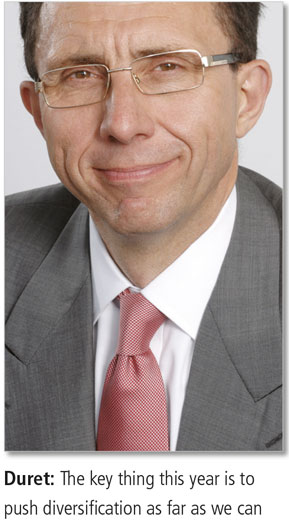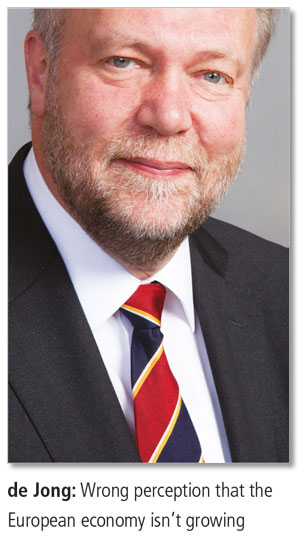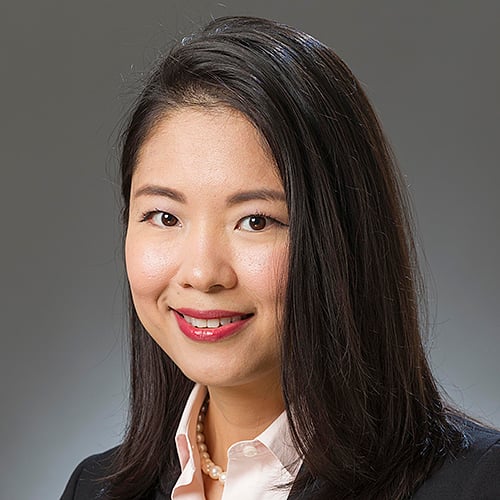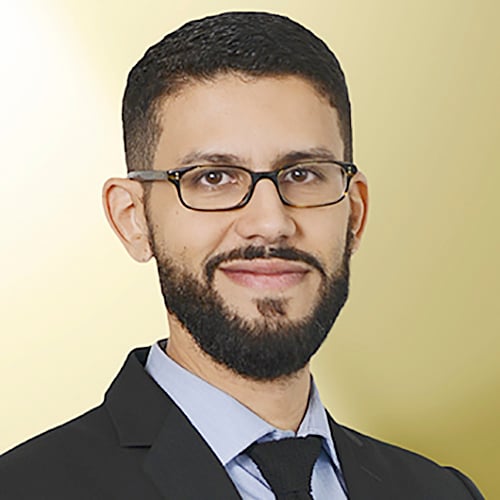ABN AMRO Private Banking is diversifying its portfolio amid fears of greater market volatility in 2015. Nonetheless, the bank maintains an optimistic outlook for the global economy, a view that runs counter to the general consensus.
The bank expects volatility to be higher this year compared with 2014, which is why it is pushing for a broad sector diversification of its e170 billion (US$192 billion) portfolio.
In terms of asset allocation, the bank has a significant equity position at 40%, while 37% are in bonds, 8% in cash, 8% in hedge funds, 3% in real estate and 2% in commodities.
“The key thing this year is to push the diversification as far as we can because the volatility regime may be higher. I think we have already entered into a period of higher volatility in the currency market and the Swiss franc is just one episode,” says Didier Duret, chief investment officer of ABN AMRO Private Banking International, referring to the market turmoil triggered by the Swiss central bank’s surprise move to abandon the ceiling on the currency.
 |
|
Although the impact of the Swiss franc’s surge on the European and global economy is expected to be limited because of the country’s relatively small economy, he warns investors should be prepared to hedge their own currencies to reduce the negative impact of currency volatility on their portfolios.
“The difference this year compared to last year is that we have seen a remarkable and dramatic shift in price when we look at the US dollar, when we look at oil, when we look at the price of bonds – meaning the yield. These will have an impact on the real economy and this impact of foreign exchange is important for asset allocation, as it leaves more chance to achieve a recovery in Europe because we have a stronger dollar,” explains Duret.
In terms of equity portfolio, ABN AMRO is slightly underweight US, overweight Europe, and overweight emerging market Asia. From a historical context, the bank has been overweight for more than two years in equities and underweight in fixed income.
“The underweight has not paid off, but I’ve been largely compensated by the overweight we have in equities. The difference this year is that the euro- dollar is creating a new momentum in European equities which have been flat over the last three years in terms of earnings. It’s very deceptive and we expect this trend to change and to pick up,” says Duret.
For fixed income, the scope for diversification has narrowed because of the higher interest rates in the US.
“This means that the yield that you buy is probably higher than the return that you will get with fixed income,” he notes.
Han de Jong, chief economist of ABN AMRO Bank, explains that the expected strengthening of the US dollar this year following years of relative weakness will act as a redistribution mechanism. Growth in the US economy is likely to spread to other parts of the world.
“The strengthening US dollar is good for the world economy because the US economy is still the world’s strongest economy, although China is growing faster. Now that the US dollar is strengthening, it moves a bit of the growth in the US economy to other regions like Europe and this is good for the stability of the global economy,” de Jong says.
ABN AMRO has a generally optimistic outlook for the global economy in 2015, despite the cut in growth forecasts by the International Monetary Fund (IMF) for the global economy earlier.
The IMF has warned that the boost from lower oil prices is outweighed by a slowdown in China, looming recession in Russia and continuing weakness in the Eurozone. It expects global growth to improve only slightly to 3.5% in 2015 from 3.3% last year. This is lower than its previous forecast made in October last year for 3.8% growth in 2015. The IMF also cut its growth forecast for 2016 to 3.7% from 4% previously.
“We think that there’s too much pessimism around. The IMF has lowered its growth forecast for 2015 but I think that’s probably too negative. I looked at their geographical breakdown and I was pleased to see that they’ve raised their forecast for US growth and we agree with that. They have slightly lowered their growth forecast for Europe which I disagree with,” de Jong says.
He argues that Europe will do better in 2015 because of significantly lower oil prices, lower euro exchange rates, and lower financing cost.
“There is a perception that the European economy isn’t growing but that perception is wrong. The European economy is growing and a number of countries are actually beating expectations. The ones that are disappointing are mainly France, Italy and Germany. Of course, they’re the largest economies so that is a concern. Germany underperformed in 2014 because of temporary factors which are now lifting and I think the outlook is now positive,” de Jong says.
Germany’s 2014 growth is seen at 1%-2% and France at 0.3% expansion as of end third quarter 2014, both of which were mainly attributed to increased government spending. Italy’s economy, on the other hand, contracted by a further 0.1% at end-Q3 last year after shrinking 1.9% in 2013.
 |
|
But things are looking up, from de Jong’s perspective, and he believes the expected growth in the US and Europe will benefit Asia, which will also benefit from reduced oil prices.
“I think the situation is more difficult for commodity exporters. Of course, there are a few in Asia but the main commodity exporters are in Latin America. I think the situation for commodity producers is more difficult,” de Jong says.
Both Duret and de Jong say the Greek elections have limited capacity to disrupt European markets or to reverberate into a systemic shock, considering the size of the Greek economy and its financial markets.





.jpg)
.jpg)


